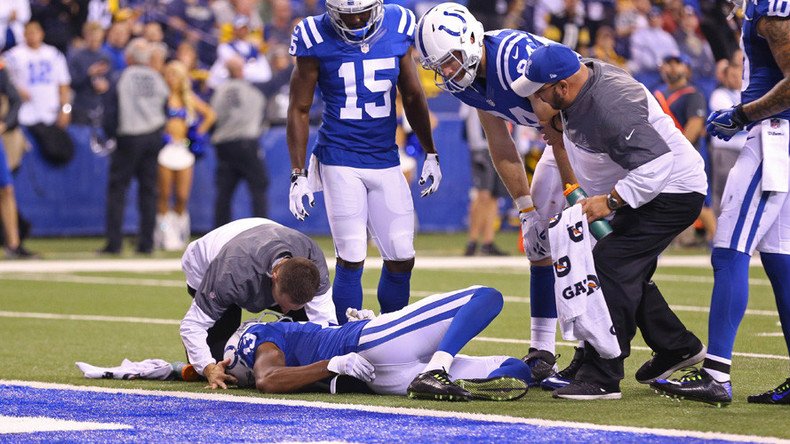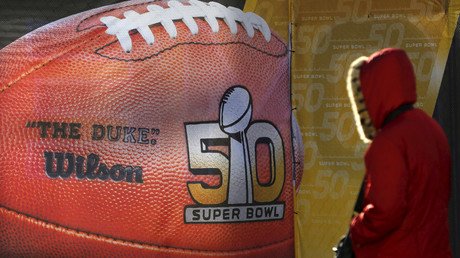NFL teams broke drug laws by pumping players full of painkillers – lawsuit

All 32 National Football League teams have pumped players with painkillers to keep them on the field, while handing and transporting drugs against the guidance of federal authorities, former players are arguing in a class-action lawsuit.
The federal lawsuit, originally filed in February in the Northern District of California, alleges wanton distribution of powerful painkillers and anti-inflammatory drugs to players, as well as a culture of storage and transportation of the drugs that, the suit says, violates numerous federal and state drug laws.
Details from the sealed, heavily-redacted court filing were revealed Thursday by the Washington Post. On Friday, Deadspin released the full, unredacted filing.
Lawsuit: NFL teams repeatedly broke federal drug laws, handed opioids out like candy: https://t.co/C5P3lvXTqipic.twitter.com/CQfDvP3XMo
— Deadspin (@Deadspin) March 10, 2017
The court filing includes testimony and documented evidence from team and NFL medical personnel, and details the brazen attitude toward the handling, record-keeping and distribution of controlled substances by the league and its teams.
Spoke to The Washington Post about their reporting on lawsuit involving painkiller abuse among NFL teams, including Ravens @cbsbaltimorepic.twitter.com/GYdw6tA9KV
— Mike Hellgren (@HellgrenWJZ) March 10, 2017
In his deposition testimony, Anthony Yates, team physician for the Pittsburgh Steelers and the former head of the NFL Physicians Society, said "a majority of clubs as of 2010 had trainers controlling and handling prescription medications and controlled substances when they should not have."
In 2012 alone, the average NFL team prescribed about 5,777 doses of nonsteroidal anti-inflammatory drugs and 2,213 doses of controlled substances to players, according to a March 2013 document from a medical adviser to the NFL. That amount averages out to around six or seven painkillers or injections per week for each player during an average NFL season.
The more than 1,800 former players involved in the lawsuit claim they have incurred serious organ damage and other medical issues based on the NFL's permissive drug-distribution practices. Several plaintiffs said they "received and consumed enormous quantities of pain-numbing and anti-inflammatory medications," without proper information about the medication or potential side effects, Deadspin reported.
Bud Carpenter, longtime trainer for the Buffalo Bills, "admitted under oath that he witnessed team doctors give players injections of prescription medications without telling them what the drug was they were receiving or its side effects."
The plaintiffs' attorney said he could not comment to the Post.
NFL spokesman Brian McCarthy told the Post that the allegations in the lawsuit "are meritless" and that the league "will continue to vigorously defend these claims."
"The NFL clubs and their medical staffs are all in compliance with the Controlled Substances Act," McCarthy told the Post, adding teams' "medical staffs continue to put the health and safety of our players first, providing all NFL players with the highest quality medical care. Any claim or suggestion to the contrary is simply wrong."
The lawsuit claims that even an NFL-funded task force formed to study the impact of a powerful, popular anti-inflammatory drug "was just additional lip service to the problems presented by Toradol." In his deposition, Yates said he saw players lining up for the "T-Train," or Toradol injections, before a game, "something that had been occurring with the Steelers for at least the previous 15 years," the lawsuit reads.
The suit goes on to name many instances in which NFL or team officials were tipped off to the potentially illegal handling and distribution of painkillers. Former NFL medical director Elliott Pellman is mentioned throughout the court filing. He was described by one person offering a deposition as "lurking in the background" of team efforts to make sure players stayed on the playing field.
The NFL's most infamous quack is all over the discussion of how teams dished out addictive painkillers https://t.co/i83F3yxwYMpic.twitter.com/QPPdqVauet
— Deadspin (@Deadspin) March 10, 2017
Dr. David Chao, a former NFL team doctor who has been sued by players in the past, said Pellman scuttled a survey of controlled medications around the NFL that Chao proposed. Chao left the San Diego Chargers in 2013 after a Chargers player was caught with a 100 doses of Vicodin. Following this incident, the US Drug Enforcement Agency (DEA) began to take notice of the NFL's drug practices.
The DEA told league physicians that, among other guidance, controlled substances could not be transported across state lines, the court filing says. The lawsuit alleges that teams often ignored DEA rules for such transportation of drugs.
Lawsuit: Former Seahawks OT Jerry Wunsch was given massive dosage of pain medication at direction of Mike Holmgren. https://t.co/pwiRdvWOb3pic.twitter.com/1pbv9waznJ
— Deadspin (@Deadspin) March 10, 2017
The lawsuit involves plaintiffs from all 32 NFL teams. The filing details the treatment of Seattle Seahawks offensive tackle Jerry Wunsch, who recalled one game in November 2003 in which team coaches, trainers and doctors colluded to pump him full of Vicodin, Tylenol-Codeine #3 and anti-inflammatories to ensure he played.
The complaint said of Wunsch: "He played – feeling high – and after half time, the Medications wore off and he told anyone who would listen that he could not play anymore, but Mr. Ramsden, the head trainer, gave him another 750 mg of Vicodin on the field for the second half, telling Mr. Wunsch, 'Don’t sue me personally for this.'"
The NFL is still the subject to much scrutiny over its handling of concussions and subsequent brain trauma in its players. A class action lawsuit, in which thousands of former NFL players sued the league over accusations that it hid the risks of concussions from players for decades, was settled for more than $700 million in 2013.
One 2014 study posited that more than 96 percent of pro football players had chronic traumatic encephalopathy, a degenerative brain disease, before dying.
The number of concussions diagnosed by NFL teams dropped in 2016 to 244, down from 275 in 2015.















